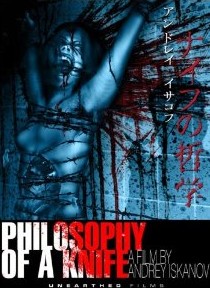 This was one of the most ambitious films of 2008, though few critics seem to have noticed. It’s a history of Japan’s notorious Unit 731, a WWII research facility that meted out horrific torture to hundreds of Chinese and Russian prisoners. This film, lasting four hours, mixes documentary and staged footage into an utterly unique whole–though not an entirely successful one, I’m afraid!
This was one of the most ambitious films of 2008, though few critics seem to have noticed. It’s a history of Japan’s notorious Unit 731, a WWII research facility that meted out horrific torture to hundreds of Chinese and Russian prisoners. This film, lasting four hours, mixes documentary and staged footage into an utterly unique whole–though not an entirely successful one, I’m afraid!
PHILOSOPHY OF A KNIFE, four years in the making, was essentially a one-man show by Russian filmmaker Andrey Iskanov, who wrote, directed, photographed, edited and designed the film himself. His research was extensive, so much so that Iskanov was detained for five days in June of 2008 and interrogated by the FSB (formerly the KGB) as to where he’d obtained the documents used in his research.
Iskanov is best known for the experimental gorefest GVOZDI (NAILS) from 2003, which received some positive notices when it was released on DVD in the U.S. by Unearthed Films, who also co-produced and distributed the present film.
The horrors of Unit 731 were previously covered in the notorious Japanese film HEI TAI YANG 731, known in the West as MEN BEHIND THE SUN. It inspired two sequels and a 1995 follow-up by the same director called HEI TAI YANG: NAN JING DA TU SHA, or BLACK SUN: THE NANKING MASSACRE.
In the 1930s the Japanese army, inspired by the examples of the German and Russian militaries, creates Unit 731, a covert bio-chemical warfare research unit. Situated in a small building amidst a snowy wilderness, Unit 731’s overseers perform all sorts of unspeakable tortures on Chinese and Russian prisoners. By this time World War II is well under way, and the unit does its dirty work amid falling bombs and a constant sense of impending doom.
A woman has her teeth extracted with pliers in an effort test the human threshold for pain. Another woman has a cockroach released into her vagina and then is skinned alive to extract the still-living roach. A man is put in a decompression chamber and literally explodes. Another is stripped and tied to a pole in minus forty degree temperatures. You get the idea.
Inevitably the war ends and the unit is disbanded. A nurse who assisted in the experiments commits suicide and many of the unit’s doctors and soldiers are brought to trial in Russia. Yet it’s acknowledged that the hideous experiments carried out by Unit 731 were directly responsible for Japan’s medical pre-eminence in the years following WWII.
This film is definitely unique, and massively ambitious. Andrey Iskanov’s painstaking research into a subject that Japan and Russia have tried for years to bury is admirable, and he’s clearly got the talent to carry off this wholly unprecedented project. I wish I could say it was fully successful in its aims, but it isn’t.
Viewing this film I couldn’t help but flash back to MEN BEHIND THE SUN, a more modest treatment of the crimes of Unit 731 that packs a far greater punch. It works because of the straightforward simplicity of its horrors; PHILOSOPHY OF A KNIFE by contrast is excessively labored and overdone.
Leaving aside the bad acting and oft-unconvincing special effects (created and executed by the director himself), this film’s torture sequences simply aren’t all they could be. Iskanov insists on inserting things like scratchy records blaring in the background of scenes and a woman playing a twanging mouth instrument, which are distractions, and lessen the horror considerably. Quite simply, nasty scenes like those depicted in this film don’t need any added ephemera to make their point.
Where the film succeeds is in its sheer progression of madness and torment. The individual scenes may not always work especially well on their own, but taken as a four-hour whole PHILOSOPHY OF A KNIFE is a remarkable evocation of pure insanity, made all the more disturbing by the fact that it’s all solidly based in reality.
Vital Statistics
PHILOSOPHY OF A KNIFE
Unearthed Films
Director/Screenwriter/Cinematographer/Editor: Andrey Iskanov
Producers: Andrey Iskanov, Stephen Biro
Cast: Tetsuro Sakagami, Elena Probatova, Yukari Fujimoto, Yumiko Fujiwara, Svyatoslav Iliyasov, Masaki Kitagava, Tatyana Kopeykina, Vladimir Kucherenko, Veronika Leonova, Maoush, Anatoly Protasov
